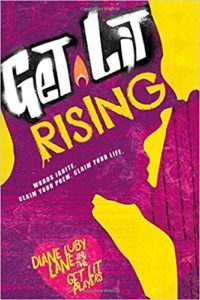Starting from Scratch: Spoken History Poems
A MiddleWeb Blog

Right now I’m barreling into the year with a project I’m beyond excited about. It asks students to choose a current issue in the news and then write and film their own spoken word poem about it.
This spoken word poetry project feels unusual (okay, scary) to me in a number of ways:
- It combines poetry and history.
- It asks students to be vulnerable early in the year by writing their own creative material.
It puts off our study of “real” history (as opposed to current events) until October.
- It brings together many new skills at once: browsing for news and feature articles on ProQuest Research Library and newspaper websites, creating a Works Cited list in NoodleTools, crafting a poem that inspires people to action.
Although I try new approaches each year with my eighth grade U.S. history students, and although I taught middle school English for years, this project still feels like a lot all at once.
I wake up in the mornings thinking about it and write notes to myself about it before I go to bed. Sometimes I’m surprised to find myself at school already because I’ve been playing through possibilities while driving.
This doesn’t feel like a traditional research project, even though students are doing research to find three articles about their topics – which are as varied as North Korean nuclear power, the damage that labels can do to children with autism, and the pay gap between men and women.
It also doesn’t feel like other recent current events projects I’ve done – an op-ed piece and a letter to Congress – even though students are forming an opinion or a stance about a current issue.
The potential to dazzle or to disappoint
What makes it feel different, I think, is that the final product has the potential to dazzle or to disappoint: to be a masterpiece that blows us all away or a scrawled draft that fizzles on contact.
Being the planner that I am, I’ve tried to create a safety net by giving background and context.
We kicked off the unit last week by watching astonishing models of spoken-word poems about important issues: Maia Mayor on her mother’s expectations in “Perfect,” Mike Rosen on the horror of 9/11 in “When God Happens,” and Warsan Shire on the challenges refugees face in “Home” (audio here), an initial inspiration for this project.
In turn, a few eighth graders emailed me some of their favorite spoken-word poems: Shane Koyczan’s “To This Day,” Rachel Rostad’s “To J.K. Rowling, from Cho Chang,” and Sarah Kay and Phil Kaye’s “When Love Arrives.” I watched these manifestos and felt carried away by their emotional impact.
An assist from a colleague
To amp up the poetic content, the eighth grade English teacher I often collaborate with did a vibrant lesson on literary devices in the first song of Hamilton, based partly on this graphical Wall Street Journal analysis of Lin-Manuel Miranda’s lyrics. As a result, our kids are now familiar with the power of alliteration, assonance, end rhyme, internal rhyme, repetition and enjambment.

With the help of these resources and many others available online, I’ve put together guidelines to jump-start students’ writing process, such as listing words related to their topic and imagining the action they would like the listener to take after hearing their poem.
After the project launch, questions that remain
Even so, as I look toward the eighth graders writing their own poems, I feel unusually nervous and wonder:
- Am I spending too much time on this project? Will students get enough out of it?
- Should I be doing a model poem of my own? I didn’t write one deliberately, because I didn’t want the structure or content of my model to influence them too much – but should I be making myself vulnerable too?
- I’m pretty sure I’m giving enough guidance on how to find news and feature articles on subscription databases and newspaper websites. But for the poem itself, am I giving too much guidance? Too little?
- Should this kind of assignment come later in the year, once we’ve read more current events and have more background in them? Or will doing the project now spark students’ empathy for current issues during the rest of the year?
- Am I giving enough time for students to write, revise and film? Will they blow through their poems in fifteen minutes or agonize for days? For the best quality drafts, how much writing should they do in class and how much at home?
Looking at all these questions, I realize how much I’m going to learn in the next several weeks about timing and writing.
Saturday, August 14, 2010 The Largo Theater, Hollywood
And, as poet and teacher Brendan Constantine urged teachers to remember at the Get Lit poetry conference, young writers can be “closer to the source” of fresh material than adults are – their views perhaps less tainted by irony, cynicism and self-doubt than ours.
As we head through the rest of this experiment, I think I have to trust in these eighth graders to show me the power of their art.
Watch this space next month for Sarah’s report on how the project went. And feel free to share any ideas you think might help her!
Feature image source: Cho Chang





































The one spoken word poet/rapper that I use for social, media and environmental examples in my Technology classroom is Prince EA. He has a strong environmental, social justice and social media point of view that supports positive life values. Good luck with your project.
Susan, this is a wonderful recommendation. Thank you so much!
So grateful to you for sharing this spoken word exercise that you did with your students. I’d welcome the opportunity to be in direct touch with you since I am going to also include a spoken word poem Reflection and Action Project as part of our lessons that accompany the Open Source educational project Touching Home in China (touchinghomeinchina.com). Could you send me your email so we could be in touch. With gratitude, Melissa Ludtke, writer of Touching Home in China, stories and lessons
Thanks, Melissa! Your project sounds interesting, and I will email you.